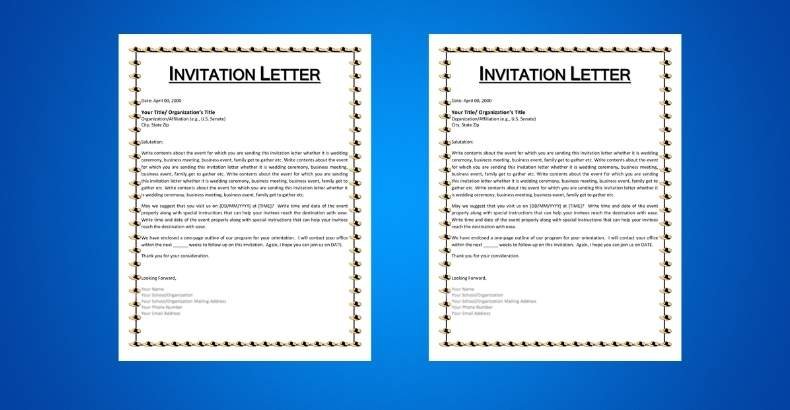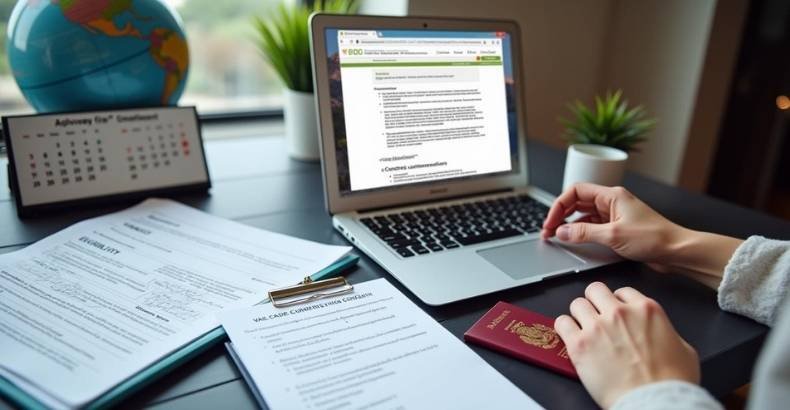Getting a conference invitation can feel like an exciting step in your professional development. Whether you’re an industry expert, researcher, or enthusiastic learner, you might find yourself asking, How do I get a conference invitation? This is a common question for many aspiring attendees.
To secure a conference invitation, start by researching relevant events and ensuring your expertise aligns with their themes. Prepare essential documents like a biography, proposal, or research abstract. Some conferences may require a recommendation letter or proof of professional qualifications. Don’t forget to follow all submission guidelines closely.
Are you curious about how to increase your chances or what steps to take next? This article covers everything you need to know to navigate the process seamlessly. Read on to find all the details.
A conference invitation is an official request to attend a conference. It is usually sent by the event organizers to speakers, participants, or guests. It gives essential details, like the schedule, venue, and purpose. This invitation helps people understand what they can expect from the conference.

Conference invitations often contain detailed information, including topics and activities. The invitation also outlines the primary objectives of the gathering. The invitation aims to encourage participation and give a better idea of what knowledge will be gained from attending. Such invitations add value by creating a professional tone.
These invitations play a role in helping people prepare for the event. They highlight the sessions, discussions, or workshops available. The information also helps attendees plan which parts of the conference to attend. Proper preparation ensures attendees can gain the maximum benefits offered by the event.
Many people look forward to attending an international conference with invitation letter that allows them to have a smoother entry process. The letter can assist in arranging travel documents like visas. These conferences allow networking with experts and learning from various fields. Invitations add convenience by helping with planning.
Participating in conferences can provide valuable networking and learning opportunities. Getting an invitation to a conference can be a strategic move for professionals. There are several ways to increase your chances of receiving an invite. By following the guide, you can improve your visibility and align with event organizers’ goals.

Start by identifying conferences that match your field of expertise or interests. Research various events through websites, social media, and professional networks. Make sure the topics discussed align with your career goals and skills. Knowing the theme of each conference can help you target the right events effectively.
Becoming a member of professional organizations or groups can help you get noticed. These associations often partner with conferences and provide exclusive invitations to their members. Regularly participate in their activities, attend meetings, and engage with others. This proactive approach can build relationships with influential figures in your industry.
Many conferences invite speakers and panelists through submissions of proposals or abstracts. Make sure your submission is well-structured and clearly outlines the value you can bring. Organizations are often looking for fresh perspectives, so showcasing your expertise in your field will increase your chances of being selected.
Building a network with key figures in your industry can open doors to conference invitations. Attend smaller events, webinars, and online discussions where these leaders are present. Engaging with them on social media platforms or during industry events helps strengthen your connections and increases your visibility.
Maintain an active online presence by regularly sharing insights, articles, and updates related to your industry. Platforms like LinkedIn, Medium, or personal blogs can showcase your expertise. Event organizers often check potential speakers and participants online before extending invitations, so staying visible increases your chances.
Your chances of receiving another invitation can be improved by attending conferences in the past. Being a regular attendee establishes you as an interested and committed member of the community. It also allows you to connect with organizers, gain insights, and make valuable contacts for future invitations.
Offering to volunteer at a conference can get you noticed by the organizers. Volunteers often have access to the behind-the-scenes aspects of events and interact with key decision-makers. By volunteering, you show your dedication to the conference’s success, which can lead to future invitations to attend.
Engaging in industry-related forums, groups, and online discussions can help you gain visibility. Many conferences monitor these platforms to spot potential speakers or panelists. By offering valuable insights and participating actively in conversations, you increase the likelihood of receiving a direct invitation.
Showcase your contributions to your field by publishing research, writing articles, or participating in industry collaborations. Organizers often invite individuals who have made significant strides or brought innovation to their field. By demonstrating your commitment to advancing the industry, you become an attractive candidate for invitations.
When trying to get an invitation to a conference, persistence is key. If you’ve submitted a proposal or made contact with organizers, don’t hesitate to follow up. To show your continued interest and to confirm receipt of your submission, kindly get in touch. A follow-up can help keep you in the organizer’s mind when considering invitations.
Securing a conference invitation requires planning, proactive engagement, and showcasing your expertise. Building relationships, participating actively, and staying visible in your field are all essential steps to getting noticed by event organizers. Keep your efforts consistent to maximize your chances.
Preparing a strong conference application or abstract is essential for increasing your chances of acceptance. While the requirements may vary, having a clear understanding of key elements can make your submission stand out to organizers and reviewers alike.
Knowing the conference theme is essential for a successful submission. Make sure your topic aligns well with the event’s focus to ensure relevance. Organizers prefer submissions that directly reflect the goals of their program. A strong connection to the theme increases your chances of being selected for presentation at the event.
Your abstract must present a concise overview of your work, including its purpose and key findings. It should clearly explain your research’s significance to the audience. Reviewers appreciate abstracts that balance clarity and depth. Ensure your abstract highlights the relevance of your work while engaging the reader with straightforward, impactful language.
For a strong application, following submission guidelines is a must. If you’re planning to attend a US conference, make sure to check the invitation process for US conferences to avoid missing crucial requirements. Missing details like formatting or deadlines can disqualify your application. Carefully reading the instructions ensures your submission complies with the organizers’ expectations, increasing the likelihood of acceptance.
Your application will stand out if you highlight your special contribution. Clearly define how your work impacts the field or addresses existing gaps. Organizers value originality and relevance, so ensure your content reflects both. Highlighting how your research adds value to the conference’s objectives significantly improves your chances of receiving positive feedback.
A polished submission is essential for making a professional impression. Proofreading ensures your content is error-free and coherent. Seek feedback from peers to refine your application further. Demonstrating attention to detail through an error-free document shows your dedication and significantly improves the strength of your conference application or abstract.
The quality of your application reflects your professionalism and commitment. Following guidelines, presenting unique contributions, and proofreading thoroughly are essential. By focusing on these elements, you increase your chances of not just acceptance but also leaving a strong impression on organizers and participants.
It takes both personal initiative and calculated moves to increase your chances of receiving a conference invitation. Focusing on untapped opportunities and building creative strategies can strengthen your approach. Following unique tips can help maximize visibility and recognition.
Consistently investing effort into standing out and building meaningful industry connections can significantly increase your chances. Strengthening your visibility and showcasing your unique value ensures sustained attention from conference organizers.
Many people forget essential details when seeking conference invitations. Avoiding these mistakes can help simplify the process and enhance your approach. Being aware of common errors can set you on the right path toward success. Keep reading for more insights.

Sending a generic request or proposal often fails to grab the attention of event organizers. Each conference has its own unique goals and audience, so it’s essential to customize your message accordingly. Take the time to understand what the event focuses on and how you can contribute meaningfully to the program.
When requesting conference invitations, timing is crucial. Reaching out too late or too early can make a difference in how your request is received. Organizers are often planning months ahead, so understanding submission deadlines and sending your request at the right time increases your chances of being noticed.
Failing to communicate what makes you unique or valuable can hurt your chances of getting an invite. Those who can contribute new ideas, knowledge, or a compelling viewpoint are sought after by event planners. By emphasizing how your presence can contribute to the event, you can make a stronger case for an invitation.
Not taking advantage of networking opportunities can limit your ability to gain an invitation to a conference. Connections play a crucial role in securing invitations, especially from key figures within your industry. Attend smaller events, connect with speakers, and engage with other professionals to increase your visibility and strengthen relationships.
Sometimes, individuals focus on sending out numerous invitations to every conference rather than focusing on quality. Spreading yourself too thin can diminish your chances of getting selected. It’s more beneficial to focus on a select number of conferences that align with your expertise and interests, allowing you to tailor your submissions effectively.
To increase your chances of receiving an invitation, avoid making common mistakes by being strategic and focused. Adjust your approach, time your submissions well, and showcase your value clearly to event organizers. Building strong connections can also play a crucial role in the process.
An important path toward networking and career advancement begins when you receive an invitation to a conference. Preparing for this exciting opportunity requires thoughtful actions to ensure your experience is smooth and successful. Keep reading for practical guidance.
Responding on time to the invitation ensures clarity for both you and the event organizers. Make sure your response includes confirmation of your availability and any required information. This step helps organizers plan and ensures your participation is seamlessly integrated into the event.
Organizing your travel documents early can save time and prevent last-minute stress. Start by checking passport validity and requirements for the host country. For international travel, familiarize yourself with the steps for conference visa approval to simplify the application process and ensure timely completion.
Gaining a thorough understanding of the conference agenda can enhance your engagement and participation. Review the schedule, session topics, and speakers beforehand. Being informed about the event’s flow allows you to plan effectively and make the most of your time at the conference.
Strategizing how you will connect with other attendees can maximize the value of your experience. Identify key participants or speakers you wish to meet. Carry professionally crafted business cards and prepare concise introductions to leave a lasting impression during conversations.
Whether you’re presenting or attending, preparation is key to making a positive impact. Review your presentation thoroughly or familiarize yourself with discussion topics. If you’re simply attending, research ways to engage actively, such as asking thoughtful questions during sessions or participating in discussions.
After receiving a conference invitation, thorough preparation ensures a successful and enriching experience. By confirming attendance, organizing travel, and planning networking strategies, you set the stage for a memorable event. Always prioritize early actions to avoid unnecessary challenges.
It is important for professionals who want to network and advance their careers to stay informed about forthcoming conference invitations. Keeping track of these events helps you plan your participation and ensures you don’t miss valuable opportunities. Read on for helpful strategies to stay informed.
You can stay up to date on upcoming conferences by subscribing to newsletters from prominent figures in the industry. These newsletters often feature announcements, dates, and details about relevant events. Make sure to check your inbox regularly for the latest updates to ensure you never miss any important conference invitations.
Social media sites provide conference updates in real-time. Following the social media accounts of industry organizations and event planners ensures you’ll get notifications when new conferences are announced. Engaging with these pages keeps you informed about upcoming events and conference invitations that are relevant to your interests.
Google Alerts is a helpful tool for keeping up with certain topics, such as invitations to conferences. Set alerts for keywords like “conference invitations,” “upcoming events,” or “call for papers.” This ensures you receive notifications about conferences as soon as they are announced, helping you stay ahead and plan accordingly.
Online communities and forums dedicated to your industry provide valuable updates on upcoming conferences. By participating in these groups, you’ll be able to receive event invitations and announcements directly from members. Active involvement also allows you to stay connected with peers and learn about upcoming industry events.
Many conferences share information about upcoming events during webinars or virtual conferences. Attending these online sessions keeps you in the loop about future conferences. These events also give organizers an opportunity to announce dates, themes, and important details, ensuring you remain informed about the latest opportunities.
Staying updated on upcoming conference invitations requires consistent effort and attention. By subscribing to newsletters, setting alerts, and engaging in online communities, you can ensure you never miss important conference details, making it easier to plan your professional development.
Facing rejection from a conference invitation can be discouraging, but it’s important to stay positive and focused. This moment can be a valuable learning experience to improve your future submissions. Here are steps to consider when dealing with rejection.

If the conference organizers provide feedback, take the time to review it carefully. Understanding their reasons for rejection can help you make necessary improvements. Use their insights to refine your submission, ensuring that your next application is stronger and more aligned with their expectations.
Rejection often highlights areas for improvement. Take this opportunity to enhance your proposal or presentation. Rework any sections that may not have clearly communicated your value or expertise. Strengthening your content and approach increases the likelihood of being accepted in the future.
Don’t hesitate to maintain contact with the event organizers after a rejection. Politely inquire about areas where your submission could be improved. Building a professional relationship with the organizers could lead to future invitations and other opportunities, showing your dedication and interest in their events.
Rejection from one conference shouldn’t be seen as the end of the road. Look for other conferences or events that align with your interests and expertise. By staying proactive, you may find even better opportunities where your skills and knowledge can shine.
Sometimes rejection can be a sign that you need to build more credibility. Take steps to strengthen your qualifications by publishing more work, speaking at smaller events, or taking on new projects. Expanding your professional profile will increase your chances of being invited to future conferences.
Keep a positive attitude after a rejection and view it as a stepping stone toward growth. Persistence is key to success in the conference circuit. Learn from each experience, keep refining your approach, and continue applying to relevant events that can help you reach your professional goals.
Being rejected from a conference invitation is a normal part of the process. By reflecting on feedback, improving your proposals, and remaining persistent, you will increase your chances of success in future applications. Stay focused on continuous growth and learning.
Below are some frequently asked questions about obtaining a conference invitation. These questions address various aspects of the process, providing additional insights that weren’t covered earlier. Whether you’re a first-time attendee or an established professional, these answers can help clarify your concerns.
Explore professional networks, industry newsletters, and event directories to find relevant conferences. Websites like Global Conference Alliance Inc. often list conferences based on your field. Additionally, joining online communities or forums helps uncover opportunities that align with your expertise or interests.
Write a clear introduction highlighting your professional background, expertise, and relevance to the event. Mention any notable achievements or areas of interest that align with the conference theme. This helps organizers see the value you can bring to their event and makes your application more compelling.
Participating in smaller events isn’t mandatory but can be beneficial. These events build your network, increase visibility, and help you understand conference formats. This preparation can improve your chances when applying for larger or international conferences, where competition is higher.
Yes, many conferences charge fees for attendance or participation, which may include registration, accommodation, or travel costs. Some events also provide fee waivers or discounts for speakers or early applicants, so it’s essential to check the conference’s website for detailed cost information.
Absolutely! An active presence on platforms like LinkedIn or Twitter can help you connect with industry professionals and organizers. Sharing your insights and participating in discussions improves your visibility, increasing the likelihood of being noticed and invited to conferences in your field.
Apply as early as possible—typically, applications open several months before the event. Early submissions allow organizers to review your materials thoroughly and might give you priority consideration. Additionally, early application ensures you have enough time to arrange travel and meet visa requirements, if necessary.
Securing a conference invitation involves careful planning, networking, and aligning your application with the event’s theme. By preparing relevant documents, meeting submission guidelines, and engaging with organizers, you can effectively answer the question, How do I get a conference invitation?
To maximize your chances, stay active in professional networks, attend smaller events, and maintain an impressive online presence. Always adjust your submissions thoughtfully, remain persistent, and approach the process with confidence. Best wishes as you pursue exciting conference opportunities ahead!
300 Lenora Street #1497, Seattle, WA 98121, United States
1 236-477-8411 (Customer Service)
1 672-971-2088 (Hotline & WhatsApp)
+1 672-971-4036 (French Customer Service)
Mon to Fri (10 am – 6 pm PST)
International Conference hosts the most engaging conferences in USA to talk about business, economics, leadership, science, technology, engineering, nursing, and many more. Join the upcoming international conferences in USA to meet with industry professionals and enrich your knowledge.
Quick LInks
Copyright © International Conference. All Rights Reserved.